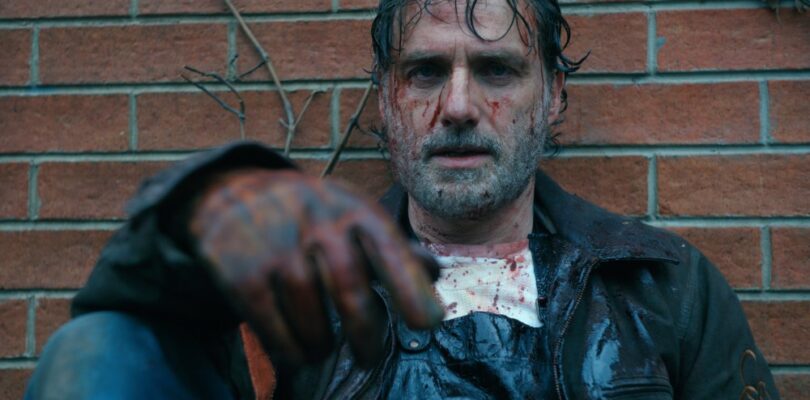The long-anticipated “The Walking Dead: The Ones Who Live,” which premieres on AMC on Feb.25, marks the return of two of the series’ most beloved characters. This should be exciting news, but in a “Walking Dead” universe that still feels oversaturated with content, even a sequel series centered on the franchise’s most iconic couple has the capacity to disappoint.
Season 9 of “The Walking Dead,” which aired in November 2018, marked the final regular appearance of Rick Grimes (Andrew Lincoln), its primary protagonist. After appearing to sacrifice himself to save his community, Rick was rescued by his mysterious sometime ally, Jadis (Pollyanna McIntosh), and whisked away by helicopter to the Civic Republic, a huge civilization ruled by a military junta known as the CRM. His wife, Michonne (Danai Gurira), departed the series the following season to search for him.
Rumors that Rick was gone from the franchise forever were greatly exaggerated, of course; not only was he still alive, his final appearance on “The Walking Dead” was immediately followed by an announcement that Rick’s story would eventually continue via a series of films. A number of factors conspired to keep these films malingering in development hell for several years, including scheduling issues, COVID delays and a decreased appetite for theatrical releases over streaming services.
Popular on Variety
Meanwhile, far from dooming “The Walking Dead,” Rick’s departure from the flagship series almost seemed to have a galvanizing effect. And while it would be a stretch to say Rick and Michonne weren’t missed at all, fans’ appetite for their story was somewhat diminished in light of the series’ continued success.
Eventually, the project evolved into a limited-run series, similar to last year’s “The Walking Dead: Dead City” and “The Walking Dead: Daryl Dixon.” However, when it comes to “The Ones Who Live,” it’s evident in the pacing that this story was not intended to be told as a miniseries.
Its genesis as a film sometimes works in its favor: the opening scenes of the first episode feature a gruesome, audacious shout-out to the comic series which sets high stakes for the series and which can only be described as “cinematic.” Unfortunately, the action stalls out somewhat after that as the story back-tracks and zooms out to contextualize the tableau.
Following this set piece, “The Ones Who Live” resumes the action six years after Rick’s rescue. He is now living in the Civic Republic in between repeated attempts to return to his family and community, all of which are soundly thwarted by CRM soldiers.
The CRM has made frequent, mysterious appearances across the franchise, most notably as the primary antagonists of “The Walking Dead: World Beyond.” Four episodes into “The Ones Who Live,” a few loose ends regarding its prior appearances have been resolved, but the series has yet to reveal much in the way of significant new world-building, and their motivations remain murky. “World Beyond” should not be required viewing to understand how the CRM operates, but at the same time, without a fresh angle to heighten the menace they brought to “World Beyond”, the CRM’s presence here feels like a retread, and it’s hard to buy into them as compelling villains.
The Rick Grimes we meet in “The Ones Who Live” is far less intense than his Alexandria counterpart. In early scenes, Lincoln approaches the role with a certain detachment. While this choice mostly works for the character, given everything Rick has survived in the Civic Republic, it’s harder to reconcile him with the Rick of “The Walking Dead” at first. As the story unfolds over the first three episodes, shades of the old Rick begin to creep in around the edges; by the beginning of Episode 4, Lincoln has fully fallen back into Rick’s rhythms, but he never approaches the sheer ferociousness of Rick Grimes at his “Walking Dead” peak.
Meanwhile, Michonne, who left Alexandria at the halfway point of Season 10 to search for Rick, has made friends and enemies along her quest. Gurira has always been incredible in this role, and taking a few years off to focus on her responsibilities to the royal family of Wakanda haven’t made her rusty. She slips back into Michonne’s skin far more easily than Lincoln does Rick’s, and as a result, Michonne’s journey initially feels like the stronger of the two parallel stories. Nevertheless, her quest also moves along at a relatively sedate pace.
As Rick and Michonne try to find their way back to one another, they forge relationships with a fresh cast of fully realized supporting characters, and Lincoln and Gurira have ample chemistry with their respective scene partners. Rick’s compatriots in the CRM, Okafor (Craig Tate) and Thorne (Lesley-Ann Brandt), are excellent foils for his particular brand of hard-headedness. Michonne, meanwhile, joins forces with a band of nomads including Nat (Matthew Jeffers), a mechanical genius with a tragic backstory and a quick wit.
The series’ adversaries are slightly less well-drawn, although there’s no shortage of acting talent on their roster. Jadis, who also served as an antagonist in “World Beyond,” resumes her infuriatingly enigmatic role as the connective tissue between the CRM and the various “Walking Dead” series. McIntosh remains competent in this thankless role, despite uneven writing and several truly terrible haircuts. Terry O’Quinn’s Major General Beale is also a cipher, but O’Quinn infuses what little he’s given with the same vague sense of menace that he wielded so precisely as John Locke in “Lost”.
More than carrying a relatively weak plot, the strong supporting cast also allows for the possibility of reviving the engine that powered “The Walking Dead’s” best seasons: the idea that any character, no matter how beloved or familiar, could be killed at any time. Obviously, Rick and Michonne will be safe; however, anyone else is fair game, and the prospect of losing any of these characters already carries weight. However, if the plot remains too bogged down by needless trivia about a dystopian stratocracy, the emotional pull from strong performances and well-drawn characters may not be enough to compensate.
Fortunately, by the third episode, the pace picks up and the central conflicts are well underway; however, viewers will have to get through the first two slow, clumsy installments in order to proceed at full steam. For fans who are still deeply invested in Rick and Michonne’s story, the series is likely to deliver the closure they’ve been craving, but this describes a fraction of an audience that is already itself a fraction of the fan base this show had at its peak. After the successful storytelling and well-established worlds of “Dead City” and “Daryl Dixon”, it feels even less necessary.
“The Walking Dead: The Ones Who Live” premieres on Sunday, Feb. 25 on AMC and AMC+.





